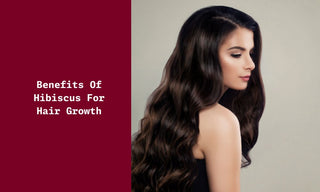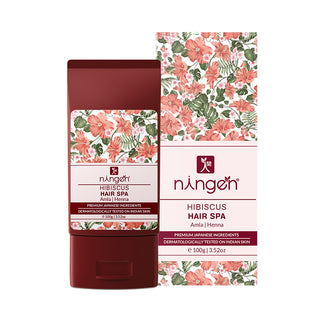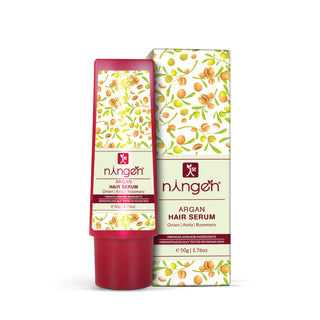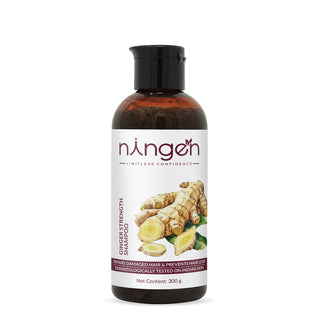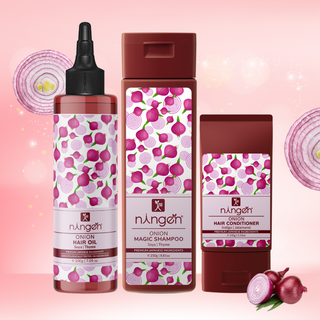"Hibiscus: Nature's secret to lustrous, healthy hair."
Have you ever wondered if there’s a natural solution to achieving long, healthy hair? Look no further than the vibrant hibiscus flower! This stunning bloom isn’t just a treat for the eyes; it’s a powerhouse of nutrients that can work wonders for your hair. Known for its rich history in traditional hair care remedies, hibiscus is a game-changer when it comes to promoting hair growth, reducing hair fall, and giving your tresses a radiant shine.
In this complete guide, we'll dive deep into the benefits of hibiscus for hair growth, uncover the science behind its magical properties, and show you how to incorporate this natural remedy into your hair care routine. Get ready to transform your hair and discover why hibiscus deserves a spot in your beauty arsenal. Whether you're dealing with thinning hair, looking to boost growth, or simply want to enhance your hair's overall health, hibiscus might just be the secret ingredient you've been searching for. So, let’s embark on this journey to healthier, fuller hair with the power of hibiscus!
In This Article;
- What is Hibiscus?
- Historical Use of Hibiscus for Hair Growth
- Science Behind Hibiscus and Hair Growth
- How to Use Hibiscus for Hair Growth
- Benefits of Hibiscus for Hair Growth
- Side Effects and Precautions of Using Hibiscus for Hair Growth
- Wrapping Up
- TL;DR(Too Long; Didn't Read)
- Frequently Asked Questions
What is Hibiscus?
Hibiscus is a genus of flowering plants in the mallow family, Malvaceae. These flowers are significant not only for their visual appeal but also for their medicinal use. Many species are known for their showy flowers, which can make a dramatic display during their blooming season. Hibiscus ranges in color from red, pink, orange, peach, yellow, or purple, and their large, funnel-shaped flowers are a distinctive characteristic. This ornamental beauty, however, is more than just a feast for the eyes; hibiscus leaves and flowers are used worldwide for herbal teas and as natural remedies, with particular attention paid to hair care.

Types of Hibiscus plants
The types of Hibiscus plants differ vastly, each with its unique appearance and habitat preferences. Some of the well-known types include:
- Hibiscus rosa-sinensis — Also known as Chinese hibiscus, this is perhaps the most iconic species many people imagine when thinking of hibiscus. It is widely cultivated for its showy flowers and is commonly used in tropical and subtropical landscaping.
- Hibiscus syriacus — Commonly referred to as the Rose of Sharon, this type of hibiscus tends to be more tolerant of cold weather and is popular in temperate zones. It also comes in a variety of colors.
- Hibiscus sabdariffa — Known for its use in herbal teas and more famously for hibiscus tea, this species is cultivated for its flavorful calyxes, which surround the plant’s blooms. It's also often referred to as roselle or sorrel.
When discussing the benefits of hibiscus for hair growth, any references will likely be to the leaves and the flowers of these plants, particularly the Hibiscus rosa-sinensis and Hibiscus sabdariffa, which are known for their hair-nourishing properties.
Historical Use of Hibiscus for Hair Growth
Hibiscus, often recognized for its vibrant flowers, has been revered for its beauty and usefulness in promoting hair health throughout history. Various cultures have tapped into the benefits of this plant for centuries, incorporating it into their hair care rituals.
In India, hibiscus has been a staple in Ayurvedic medicine, with its use dating back to ancient times. Indian women have traditionally used hibiscus oil to stimulate hair growth, harnessing its rich supply of vitamins and minerals. They would concoct herbal remedies by blending hibiscus petals and leaves with other beneficial ingredients to create potent hair oils and masks.
Meanwhile, in Africa, the plant’s natural properties were employed to combat dandruff and nourish the scalp. The Egyptians weren’t far behind in recognizing hibiscus’ magical properties, using it for enhancing shine and volume of the hair.
Not only does historical use confirm hibiscus as a hair growth stimulant, but it also underscores the plant's ability to prevent hair fall and thwart premature graying, making it an enduring and versatile ingredient in the realm of hair care.
This deep-rooted historical connection between hibiscus and hair growth reflects a cross-cultural appreciation for the plant's remarkable hair benefits.
Science Behind Hibiscus and Hair Growth
Hibiscus has long been heralded not only for its aesthetic splendor but also for its biological prowess in fostering healthy hair. The plant's influence on hair growth is attributed to its bioactive compounds, which are believed to rejuvenate the scalp and hair follicles. Due to its rich stock of vitamins, amino acids, and antioxidants, hibiscus is thought to enhance the overall environment conducive to hair growth. The bioactive constituents within the plant can also play a role in maintaining the integrity of the scalp's epithelial cells, which is crucial for sustaining hair growth cycles.
Furthermore, the astringent properties of hibiscus help to regulate sebum production, maintaining optimal scalp health and preventing clogging of pores, which can otherwise stifle hair follicles. Its high mucilage content contributes to improved hair manageability, reduced breakage, and a consequent positive impact on hair retention and length. Scientific research continues to delve deep into understanding these mechanisms, offering evidence for the plant's ability to potentially simulate conditions that promote healthier and fuller hair.
Components of Hibiscus That Promote Hair Growth
The magic of hibiscus for hair growth can be ascribed to several naturally occurring compounds within the plant:
- Vitamin C: Known to stimulate collagen production, crucial for hair strength.
- Amino Acids: The building blocks that nourish and rebuild hair.
- Alpha-Hydroxy Acids (AHAs): Promote exfoliation and stimulate hair growth.
- Alopecia-Preventing Agents: Compounds that may help mitigate hair loss.
- Antioxidants: Including flavonoids and phenolic compounds, which protect hair follicles against oxidative stress.
Each component of the hibiscus works in harmony to not only encourage hair growth but also to ensure the existing strands remain healthy and robust.
Research studies supporting the benefits of Hibiscus for hair growth
Research studies have sought to provide scientific validation for the effectiveness of hibiscus in hair growth and care. A table summarizing some researched benefits is provided below for clarity.
|
Study |
Year |
Key Findings |
|
Evaluating the efficacy of hibiscus extracts in alopecia treatment |
2014 |
Demonstrated significant hair growth activity in test subjects |
|
Study on the impact of herbal hair masks including hibiscus |
2017 |
Showed improvements in hair texture and reduced hair fall |
|
Analysis of hibiscus’s antioxidant properties in hair care |
2019 |
Found that antioxidant-rich hibiscus could protect the hair from environmental damage |
How to Use Hibiscus for Hair Growth
Hibiscus, with its rich supply of vitamins and minerals, is a powerful natural remedy for promoting hair growth and maintaining healthy locks. Here’s how you can incorporate this vibrant flower into your hair care routine:
1. Hibiscus Hair Oil
Ingredients:
- Hibiscus flowers and leaves
- Coconut oil or olive oil
Instructions:
- Wash and crush a handful of hibiscus flowers and leaves.
- Heat a cup of coconut or olive oil in a pan.
- Add the crushed hibiscus to the oil and let it simmer for 10-15 minutes.
- Allow the oil to cool and strain out the solids.
- Massage the oil into your scalp and hair. Leave it on for at least 30 minutes, or overnight for deeper conditioning.
- Wash your hair with a mild shampoo.
Benefits: This oil nourishes the scalp, strengthens the hair roots, and promotes hair growth.
2. Hibiscus Hair Mask
Ingredients:
- Hibiscus flowers and leaves
- Yogurt or aloe vera gel
Instructions:
- Grind hibiscus flowers and leaves into a fine paste.
- Mix the paste with yogurt or aloe vera gel to form a smooth consistency.
- Apply the mask to your scalp and hair, ensuring all strands are covered.
- Leave it on for 30-60 minutes.
- Rinse thoroughly with lukewarm water and shampoo as usual.
Benefits: This mask helps in reducing dandruff, conditioning the hair, and stimulating hair growth.
3. Hibiscus and Amla Hair Pack
Ingredients:
- Hibiscus powder
- Amla powder
- Water or rose water
Instructions:
- Mix equal parts of hibiscus powder and amla powder.
- Add water or rose water to form a paste.
- Apply the paste to your scalp and hair.
- Leave it on for 30-40 minutes.
- Rinse off with water and a mild shampoo.
Benefits: This pack enhances hair growth, prevents premature graying, and adds volume to the hair.
4. Hibiscus Tea Rinse
Ingredients:
- Dried hibiscus flowers
- Water
Instructions:
- Boil a handful of dried hibiscus flowers in 2 cups of water.
- Let it steep for 10-15 minutes, then strain the liquid.
- After shampooing, use the hibiscus tea as a final rinse.
- Leave it in your hair without rinsing it out.
Benefits: This rinse adds shine, strengthens hair strands, and promotes overall hair health.
5. Hibiscus Shampoo
Ingredients:
- Hibiscus flowers and leaves
- Mild shampoo
Instructions:
- Blend hibiscus flowers and leaves into a fine paste.
- Mix the paste with your regular shampoo.
- Use this mixture to wash your hair as you normally would.
Benefits: Incorporating hibiscus into your shampoo routine helps maintain scalp health and promotes hair growth.
Note: If you want to know the benefits of onion for hair growth. Click on the link.
Benefits of Hibiscus for Hair Growth
Hibiscus is not only a stunningly beautiful plant, but it also packs a powerful punch when it comes to nourishing and promoting hair growth. Known for its rich vitamin C and amino acid content, hibiscus can rejuvenate the scalp and enhance the overall hair growth process. Furthermore, its ability to stimulate collagen production, a vital protein for hair growth, helps ensure that each hair strand is healthy and robust. Incorporating hibiscus into your hair care routine unlocks these benefits, contributing to longer, stronger, and more lustrous hair.
Stimulates Hair Follicles
The natural properties of hibiscus make it an excellent stimulant for hair follicles. It invigorates the scalp by increasing blood circulation, which is crucial for transporting essential nutrients to the hair follicles. This stimulation encourages hair follicles to remain active, thus promoting healthier hair growth. When massaged into the scalp, hibiscus-infused oils or rinses serve as catalysts for this invigorating action, setting the foundation for strong and vibrant hair growth.
Strengthens Hair Roots
Weak hair roots can lead to increased hair loss, and hibiscus is a natural fortifier. Its richness in essential nutrients helps to reinforce the hair from the roots, minimizing the risks of hair fall. By providing much-needed nutrients directly to the hair roots, hibiscus ensures that the hair grows out stronger and is less prone to falling out. Consistent use of hibiscus treatments can lead to noticeable improvements in hair texture and robustness.
Prevents Hair Breakage and Split Ends
Split ends and hair breakage are signs of hair damage and poor hair health. Hibiscus is laden with vitamins and amino acids that not only prevent these issues but can also help to repair damaged strands. Its natural conditioning properties smooth down rough cuticles and minimize breakage and the formation of split ends. Regular topical application through masks or rinses helps to maintain hair elasticity and strength, leading to lesser occurrences of these common hair concerns.
Enhances Hair Growth
Lush, long hair is highly desired, and hibiscus assists in achieving this goal by enhancing the rate of hair growth. Its nutrients work to improve the overall hair production cycle, leading to quicker and healthier hair growth. Hibiscus's components also help in maintaining the health of the scalp, which is crucial for sustaining steady hair growth. With regular use, hibiscus can help your hair not only grow more quickly but also ensure that it stays thick and full.
Reduces Hair Fall
Hair loss is a distressing phenomenon for many, and hibiscus offers a natural remedy. It strengthens the hair from its roots, reduces inflammation of the scalp, and cleanses it of impurities that can contribute to hair fall. Hibiscus's ability to condition the hair also lessens the hair's susceptibility to breakage, a common cause of hair fall. Incorporating hibiscus into your hair care routine forms an effective defense against excessive shedding, keeping your hair dense and plentiful.
Natural conditioner for smooth and shiny hair
The unique composition of hibiscus makes it an excellent natural conditioner. Due to its high mucilage content, which is a slimy plant protein, hibiscus helps in detangling hair while maintaining its integrity. When used as a rinse or mask, it can impart a sleek, shiny finish to your hair, comparable to the effects of a chemical conditioner, but without the harsh side effects. The amino acids present in hibiscus nourish hair, making it smooth and luscious, easing the struggle of managing tangled and unruly hair.
Treatment for dandruff and scalp issues
Dandruff and scalp irritations can be both uncomfortable and embarrassing, but hibiscus brings relief to such conditions. Its anti-inflammatory and antimicrobial properties make it an ideal candidate for treating dandruff and other scalp-related issues. Regular use of hibisculus-infused hair care products can soothe the scalp, reduce flakiness, and prevent fungal and bacterial issues that could be contributing to dandruff or itchy scalp.
Natural remedy for premature graying of hair
The premature graying of hair is often a sign of aging or stress, but it's increasingly common at younger ages due to various lifestyle factors. Hibiscus is rich in antioxidants and vitamins that can slow down the graying process. The presence of anthocyanins, potent antioxidants, helps in preserving the natural pigment of the hair, while vitamins help in the production of melanin, the substance responsible for your hair's color. Incorporating hibiscus into your hair care regimen can keep the hair's original color vibrant for longer, providing a natural solution to the premature aging of hair.
Note: Know how to take care of your hair in summer. Click on the link.
Side Effects and Precautions of Using Hibiscus for Hair Growth
While hibiscus is often celebrated for its hair growth benefits, it's crucial to consider possible side effects and take appropriate precautions. Like any natural remedy, hibiscus has the potential to cause adverse reactions in some individuals. Being informed about the possible risks and how to mitigate them ensures a positive experience when incorporating hibiscus into your hair care regimen.
Potential Allergic Reactions
Individuals with a known sensitivity to hibiscus should avoid its use, as it can provoke allergic reactions. Reactions can range from minor skin irritation to more severe conditions such as contact dermatitis or itching. Before using hibiscus on your hair or scalp, conduct a patch test: apply a small amount of hibiscus-infused product to a discreet area of skin and monitor for 24 hours for any adverse reactions.
Interaction with Certain Medications
Before using hibiscus, it's essential to be aware of any potential interactions with medications. Hibiscus can affect the way that your body processes certain drugs, which could increase or decrease their effectiveness. Notably, hibiscus may interact with anti-hypertensive drugs or those used for treating diabetes, potentially affecting blood pressure and blood sugar levels. Consult with a healthcare provider before using hibiscus products if you are on any medications.
Precautions for Pregnant and Breastfeeding Women
The safety of using hibiscus for hair growth has not been well studied in pregnant and breastfeeding women. To err on the side of caution, these individuals should consult a healthcare provider before using hibiscus products. Natural does not always mean safe in every situation, and the risks versus benefits should always be weighed carefully.
Remember, while hibiscus can offer phenomenal benefits for hair growth and care, personal safety and health always come first. Users should proceed with caution and seek professional advice when necessary.
Wrapping Up
Now you know the benefits of hibiscus for hair growth and how it transforms dull hair into a radiant mane. Incorporating hibiscus into your hair care routine can significantly enhance hair growth, reduce hair fall, and improve overall hair health. Whether used as an oil, mask, pack, tea rinse, or shampoo, hibiscus offers a natural, effective solution for beautiful, healthy hair. Its rich supply of vitamins, amino acids, and antioxidants makes hibiscus a powerful ally in your journey to healthier, more vibrant locks. Embrace this natural remedy and discover the transformative benefits that hibiscus can bring to your hair care regimen.
Quick view
Hibiscus is a powerful natural remedy for promoting hair growth and maintaining healthy hair. It has been used historically in various cultures and is known for its rich vitamins, amino acids, and antioxidants. Hibiscus can stimulate hair follicles, strengthen roots, prevent breakage, and add shine. It can be used in various forms such as hair oil, masks, packs, tea rinses, and shampoos. Incorporating hibiscus into your hair care routine can enhance hair growth, reduce hair fall, and improve overall hair health.
Frequently Asked Questions
Question: What are the main benefits of hibiscus for hair growth?
Hibiscus stimulates hair follicles, strengthens hair roots, prevents breakage and split ends, enhances hair growth, reduces hair fall, and conditions the hair for a smooth, shiny finish.
Question: Can hibiscus help with dandruff?
Yes, hibiscus has anti-inflammatory and antimicrobial properties that can help treat dandruff and soothe the scalp.
Question: How can I use hibiscus oil for hair growth?
Crush hibiscus flowers and leaves, simmer them in coconut or olive oil, strain, and apply the oil to your scalp and hair. Leave it on for at least 30 minutes or overnight before washing it off.
Question: Is hibiscus effective in preventing premature graying?
Hibiscus is rich in antioxidants and vitamins that help preserve natural hair pigment and may slow down the graying process.
Question: What is a good hibiscus hair mask recipe?
Grind hibiscus flowers and leaves into a paste, mix with yogurt or aloe vera gel, apply to the scalp and hair, leave for 30-60 minutes, and rinse thoroughly.
Question: Can I use hibiscus if I have sensitive skin?
If you have sensitive skin, conduct a patch test before using hibiscus products to check for any allergic reactions.
Question: Does hibiscus interact with medications?
Hibiscus may interact with certain medications, especially those for blood pressure and diabetes. Consult a healthcare provider before use if you are on medication.
Question: Is hibiscus safe for pregnant or breastfeeding women?
The safety of hibiscus during pregnancy and breastfeeding is not well studied, so it is advisable to consult a healthcare provider before use.
Question: How does hibiscus help in reducing hair fall?
Hibiscus strengthens hair from the roots, reduces scalp inflammation, and conditions the hair, which helps in reducing hair fall.
Question: Can I make a hibiscus shampoo at home?
Yes, blend hibiscus flowers and leaves into a paste, mix with your regular shampoo, and use as usual to wash your hair.
Question: Does Hibiscus Make Hair Black?
Hibiscus can enhance the natural color of dark hair, making it appear more vibrant. It contains natural pigments that can deepen the color of black or brown hair, giving it a more lustrous look. Additionally, hibiscus helps to slow down premature graying, helping to maintain your hair's natural color for longer. However, it does not act as a permanent dye and will not turn light-colored hair black.


